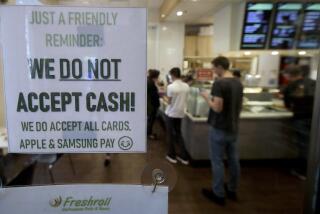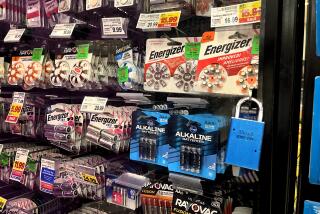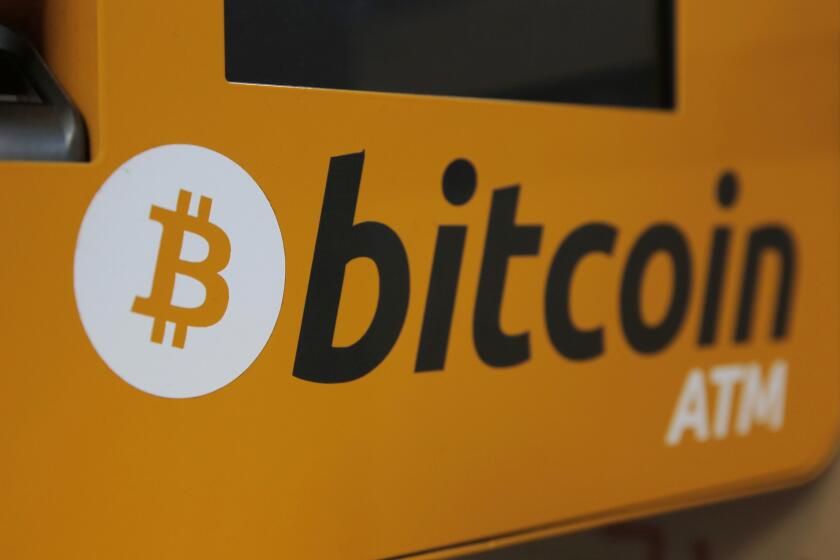Retailers seek to cash in on mobile-payment trend
With more shoppers wielding smartphones instead of credit cards and cash to pay for purchases, some of the nation’s largest retailers and restaurants are trying to wrest control of the fast-emerging mobile-payment industry away from technology firms.
More than a dozen merchants, includingWal-Mart Stores Inc.,Target Corp.,Best Buy Co.andSears Holdings Corp., said Wednesday that they were teaming up to develop their own walletless platform, including an app, that will enable tech-savvy customers to quickly pay for goods with their smartphones.
The move underscores the largely untapped but potentially enormous mobile-payment market, which until now had been mostly ignored by traditional bricks-and-mortar stores.
The new company, called Merchant Customer Exchange, or MCX, joins established mobile-payment providers such as Google Wallet and apps from tech start-ups Square, PayDragon and Kuapay.
“Retailers seem to be late to the game,” said Marshal Cohen, chief industry analyst at market research firm NPD Group. “But is it a good move? Yes.”
By developing their own platform, merchants can continue to influence or control the shopping experience and gain insight into what certain shoppers are buying, as well as when and how often, instead of turning that information over to third-party companies.
MCX represents “a real threat” to Square, Google, PayPal and other third-party mobile-payment providers by cutting out the middleman, said Sam Hamadeh, chief executive of PrivCo, which researches privately held companies.
The strategy will also be cost-effective for merchants: Although the virtual-wallet option is free for consumers, merchants typically pay mobile-payment operators to use their systems, or give them a small cut of their sales.
MCX, a Dallas company that has been in development for months, is still in the early stages. A search is underway for a chief executive, and details about the mobile app that is being developed are scarce.
MCX didn’t provide a time frame for when the app would be released, which mobile operating systems it would be available on or how it would work.
Mike Cook, corporate vice president and assistant treasurer at Wal-Mart, said developing a merchant-led walletless payment system would drive efficiency by eliminating a step in the payment process.
“Many of the solutions out there today do not meet the expectations of consumers or merchants,” he said.
Other MCX members said they were more qualified than tech firms to offer a more useful mobile-payment app for shoppers.
“As merchants, no one understands our customers’ shopping and payment experience better than we do,” said Mark Williams, president of financial services at Best Buy.
Tech firms said the adoption of mobile payments by recognizable brands would increase consumer awareness of the technology, benefiting all walletless operators. But Hamilton Chan, founder and CEO of Hollywood-based PayDragon, said he thought consumers would ultimately prefer to use an app from “companies where technology is the core focus.”
With about half of U.S. consumers owning smartphones, mobile payments, though still in their infancy, are quickly catching on. The transactions are expected to increase 62% this year, according to research firmGartner Inc.By 2016, mobile payments are expected to reach $617 billion worldwide, a nearly sixfold increase from last year’s $105 billion, the firm said. By then smartphones are expected to account for close to two-thirds of all U.S. cellphones.
As smartphones have grown in popularity, mobile payments have become such big business that the largest banks and credit card firms are partnering with wireless carriers, phone makers and software developers to push the smartphone further into the center of global commerce.
There are big advantages to electronic money. It’s easier and quicker to process than cash or plastic, and without the need to fish around for credit cards or wait for receipts to print, long lines could become a thing of the past.
The plan is to turn your phone into a digital wallet that lets you pay for just about anything, whether you’re online or at the register. Some mobile-payment options allow shoppers to skip the lines altogether.
Thirty percent of American cellphone owners are interested in using mobile payments, according to a Forrester Research survey of 7,600 adults. Younger consumers are particularly keen on the practice. But Forrester says it could be three to five years before mobile payments become truly mainstream.
Gartner, meanwhile, predicts the market will be fragmented for the next two years as merchants introduce their own mobile-payment services.
As with many digital technologies, security remains a major concern.
Industry officials and analysts acknowledge that when a consumer makes a mobile payment, the money moves through more hands than it would with a cash or credit payment.
Typically, in addition to the smartphone maker, payment information flows through the app, and then through the phone’s operating system. Then it gets passed through payment firms such as Visa or PayPal on its way to plucking the money from your bank account.
Other merchants who have signed on to MCX include 7-Eleven, Lowe’s, CVS Pharmacy, Shell Oil and Darden Restaurants, owner of the Olive Garden and Red Lobster brands. The company said it would announce additional merchants and more details “in the weeks and months ahead.”
“It’s a completely different retail environment than it was even a year or five years ago,” Target spokeswoman Amy Reilly said. “It’s so important to meet our guests where they are and how they like to shop, and this is one element of that.”
More to Read
Inside the business of entertainment
The Wide Shot brings you news, analysis and insights on everything from streaming wars to production — and what it all means for the future.
You may occasionally receive promotional content from the Los Angeles Times.










